STAKEHOLDER RELATIONSHIPS

Key Elements
R217,6 million spent on SED Initiatives (2016/17: R186,3 million)
2017 Investment Analyst Society Awards Winner: Consumer Products Sector
Key priorities going forward
Zero fatalities and improved safety performance
Implementing the South African National Standards (SANS) 16001 on wellness management systems
Tongaat Hulett recognises the important contribution that stakeholders make to the ongoing success of the organisation. The company has long-standing relationships with multiple stakeholders and aims to achieve outcomes that represent a “win all” for every key stakeholder involved in various engagements. The process to increase Tongaat Hulett’s understanding of its stakeholders is ongoing and includes identifying important clusters based on the degree to which they influence or are impacted on by the business, and documenting the various proactive engagements that are already in place as the business seeks to further strengthen these relationships. These details are outlined below.
| Nature of engagement | Priorities for stakeholders | Outcomes | |
| Shareholders, investors and analysts | |||
| Government authorities and regulators in the region |
|||
| Private farmers | |||
| Local communities | |||
| Employees | |||
| Customers, suppliers and service providers |
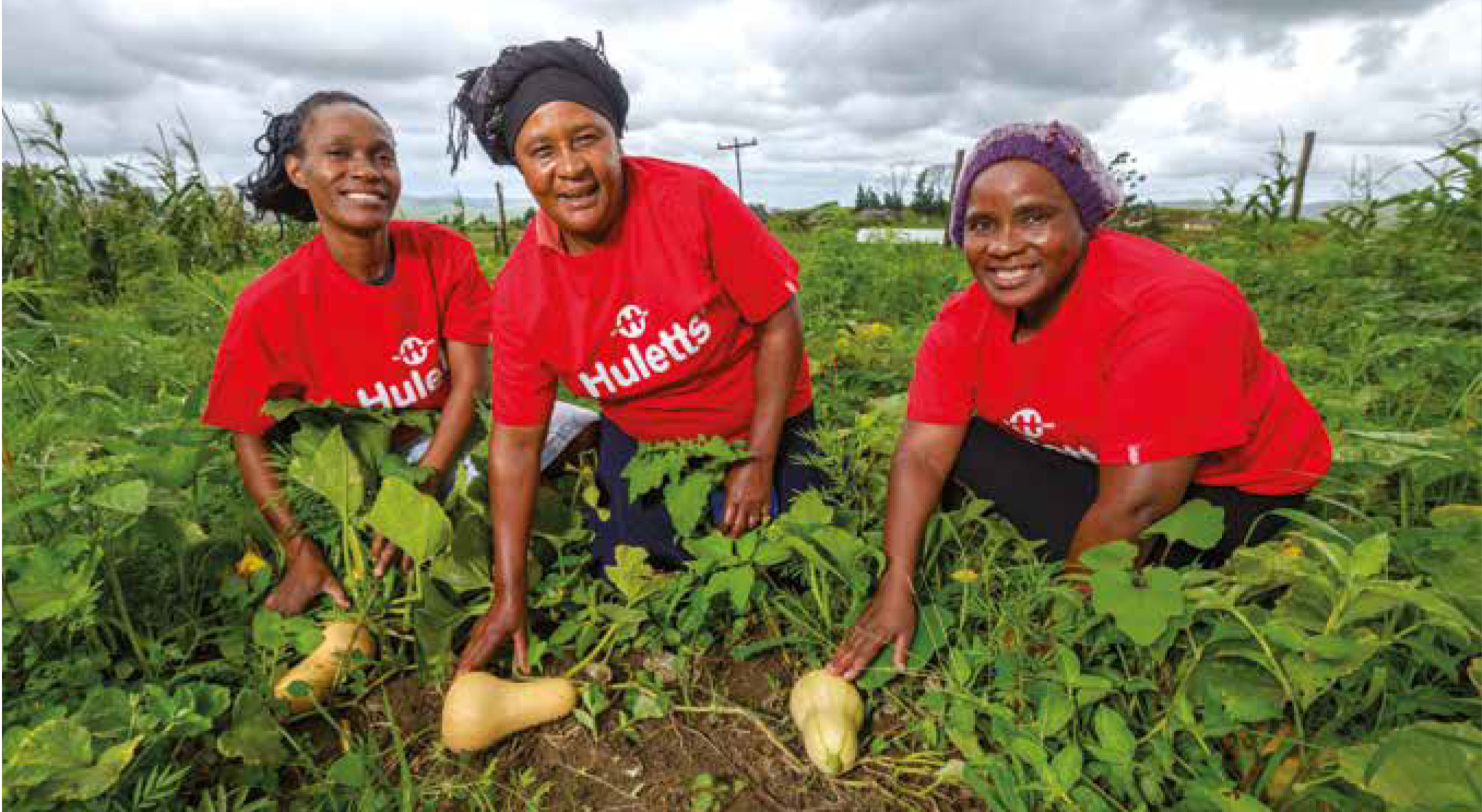
SOCIO-ECONOMIC DEVELOPMENT
Societal dynamics can play an increasingly significant role in organisations, particularly those multinationals that are based in Africa. Tongaat Hulett understands this reality and has over many years articulated its commitment to working with its key stakeholders with the following objective in mind: “Value creation for all stakeholders through an all-inclusive approach to growth and development”. Tongaat Hulett’s SED programme, which incorporates application of the SDGs, is one of the strategies to strengthen and build improved relationships with government and society, specifically those stakeholders that are most impacted by the company’s activities. The principles which it embraces in its approach to SED include:
- Corporate governance - the business continues to adhere to legal and accepted business practices.
- Corporate social responsibility - the company demonstrates responsibility to society by minimising any negative impact and extending philanthropic and charitable inputs to the communities that it operates in.
- Social sustainability and innovation - Tongaat Hulett is developing innovative practical approaches to transform society and the environment thereby uplifting communities.
The business exceeded its commitment of allocating one percent of annual headline earnings to SED for the 12 months to 31 March 2018. For the period, Tongaat Hulett invested R217,6 million in its SED initiatives (2016/17: R186,3 million), including the cost of company-sponsored occupational and primary healthcare services. Operations in Zimbabwe, Mozambique and Swaziland accounted for 92 percent of the total amount invested in SED initiatives. Key elements of SED spend for the period were as follows:
HEALTHCARE
- With most operations in rural areas, a significant amount is invested in running healthcare facilities for employees and local communities.
- R103,6 million was invested in health-related activities.
Basic needs
- Tongaat Hulett continues to invest in basic needs and social development, which includes food security projects and the provision of basic materials, to uplift communities around company operations.
Sports, arts and culture
- The company acknowledges the important role that arts, sports and culture can play in the development of successful rural communities. R15,9 million was invested in these initiatives during the year. In Zimbabwe and Mozambique soccer plays a significant role in communities and Tongaat Hulett sponsors various teams in these operations.
Education
- R20,8 million was invested in education initiatives across the company. This included the purchase of exercise and textbooks and new chairs in the estate schools in Mozambique, Swaziland and Zimbabwe. During the period schools managed by the company in Zimbabwe had 14 787 pupils enrolled.
CASE STUDY
TONGAAT HULETT PARTNERS WITH
GUDO COMMUNITY IN ZIMBABWE

Maintaining and consistently improving stakeholder
relationships remains an integral part of Tongaat Hulett’s
business model through its SED activities. According to SDG 3,
ensuring healthy lives and promoting the well-being for
all, at all ages, is essential to sustainable development.
Tongaat Hulett understands the importance of this
approach and is actively involved in healthcare related SED
activities in the communities that surround its sugarcane
growing operations. An example of this commitment
is demonstrated through the company’s Zimbabwean
operations who have partnered with the local authorities
and community in Gudo, 97 km from Chiredzi, to construct
the Gudo Clinic, that will benefit an estimated 10 000 families.
Read more
CASE STUDY
MOZAMBIQUE WATER SUPPLY
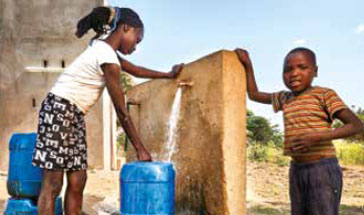
Tongaat Hulett’s Mozambique operations at Xinavane and
Mafambisse are located fairly close to the cities of Beira and
Maputo respectively. Given the large rural communities that
surround these operations there remains multiple opportunities
to significantly contribute to the ongoing development of both
the people and the areas. The initiatives that Tongaat Hulett
continues to undertake in these operations are in accordance
with the SDG 6 which states that, “Access to safe water and
sanitation and sound management of freshwater ecosystems are
essential to human health and to environmental sustainability
and economic prosperity.”
Read more
FOOD SECURITY
The world’s food systems play a central role in the well-being of ecosystems and human societies, and are a key driver of economic livelihoods. They contribute to most of the SDGs. However, today’s food systems will not be able to feed the world’s growing population both nutritiously and sustainably. Most smallholder farmers in Sub-Saharan Africa are challenged by a lack of technical farming skills, capital and adequate mechanisation. In addition, they farm on small parcels of land that are often degraded and have no access to irrigation. Tongaat Hulett understands the crucial role that agriculture can play in improving food security, and ensuring environmental safety. Its strategy is underpinned by the following parameters:
Change of attitude in agriculture
- Agriculture will thrive when governments, businesses, policymakers, civil society and farmers (commercial and smallholder) jointly develop solutions to improve food security.
Land reform and water storage capacity
- Beneficiaries to be selected based on farming experience and provided with proper and adequate support, including partnerships with organised agriculture.
Greater investment in agriculture
- Increase expenditure aimed at improving agricultural infrastructure, research and development, and education and training for smallholder farmers.
Make agriculture an attractive career option for young people
- Develop innovative tools and measures that will ensure that all farmers, and particularly smallholders, can improve their competitiveness. In addition, ensure that young people are made aware of farming as a business career option that offers opportunities to engage in all areas of the value chain.
CASE STUDY
JOBS FUND PARTNERSHIP ENDS ON A HIGH
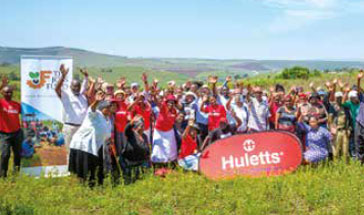
Tongaat Hulett believes in partnering with stakeholders to
address the socio-economic challenges in the areas in which
the company operates. The recently completed Jobs Fund
partnership assisted in addressing these challenges and meeting
several of the SDGs in northern KwaZulu-Natal, which has high
rural unemployment and poverty rates.
Read more
CASE STUDY
FOOD SECURITY THROUGH LAND CARE
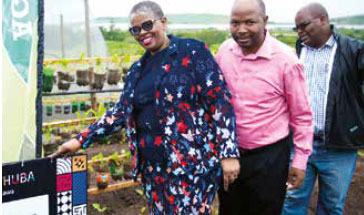
Tongaat Hulett’s commitment to creating value for all
stakeholders through an all-inclusive approach to growth and
development is being demonstrated through an innovative
project that applies numerous SDGs. The pilot project
demonstrates climate smart urban farming’s potential to address
the multiple challenges facing urban development in eThekwini
Municipality, including pollution, unemployment and poverty.
Read more
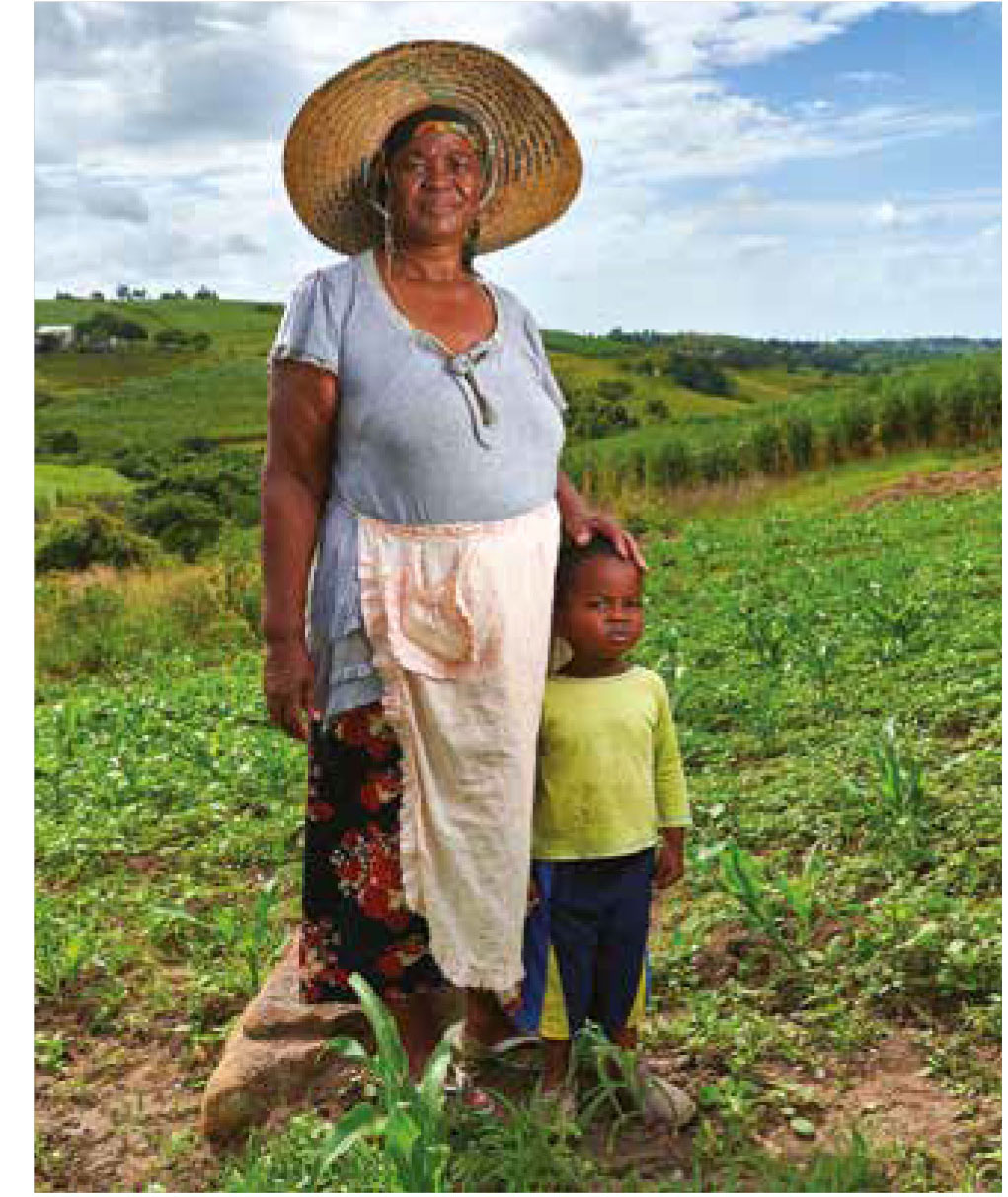
PROMOTING SUSTAINABLE AGRICULTURE
For agriculture to be sustainable, land and water must be used efficiently to reduce negative impact on the environment and ensure resilience to climate change. Tongaat Hulett believes that better farming practices will halt, and in some instances, reverse the negative process of soil degradation. Fertile soil is the foundation of sustainable agriculture, but poor farming practices and extreme weather lead to soil erosion and infertility.The company applies a range of conservation methods and complements agricultural extension projects with a portfolio of partnerships in advanced crop science and land-use strategies to ensure that every field is environmentally assessed before planting. In selected areas, depending on soil conditions and other agronomic influences, a range of cover crops are used to improve soil conditions and nitrogen prevalence for the subsequent sugarcane crop. Sustainable farming solutions include not tilling the land, crop rotations, bringing vegetation back to degraded land and planting vegetation around fields to prevent erosion.
CASE STUDY
MOZAMBIQUE SMALL-SCALE GROWER TRAINING
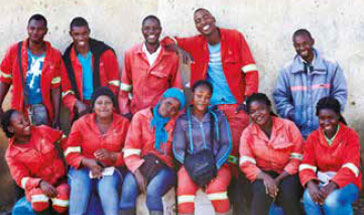
Tongaat Hulett has set itself the objective of contributing towards
the creation of successful, sustainable small-scale sugarcane
farmers. With sugarcane farming not being a traditional farming
activity in Mozambique, local farmers generally lack the required
knowledge and expertise. Due to the reality that most local
famers were previously subsistence farmers, they also require
additional training in farming as a business. These skill shortages
can influence productivity, viability and the sustainability of
the small-scale grower associations that have been created. To
address these requirements Tongaat Hulett has developed a
farmer training and skills development programme to meet the
training and development needs of these emerging farmers.
Read more
SUPPLY CHAIN
In line with the philosophy of "Sustainable value creation for all stakeholders through an all-inclusive approach to growth and development", Tongaat Hulett continues to work closely with the various governments and other stakeholders in countries where the business operates. Supply chain has proven to be a great conduit in addressing the socio-economic dynamics in each of these countries, in efforts to improve the quality of lives and promote economic development.
In South Africa, Tongaat Hulett Limited is aligned with the national B-BBEE agenda and has contributed towards changing the socioeconomic landscape over the years. This is evidenced by the attainment of a Level 3 B-BBEE status in the latest verification of June 2017, which was a notable improvement from the previous performance of Level 4 B-BBEE status - with the business once again achieving full points for SED and ED. Both the revised Property sector and Agricultural (AgriBEE) sector codes have been gazetted. Therefore, the land conversion and agricultural operations, will be verified against these codes in the upcoming BEE audit process, which commenced in May 2018. While these revised sector codes are more onerous, highly stringent and are being conducted against a backdrop of more difficult economic conditions globally, the business has been hard at work to ensure B-BBEE performance is improved, or at least maintained.
The Enterprise and Supplier Development (ESD) element consists of Preferential Procurement, ED and Supplier Development. This aims to strengthen and increase local procurement, particularly from Black Owned (BO) and Black Women Owned (BWO) entities, to help broaden South Africa's industrial base. The Tongaat Hulett ESD strategy, is designed to diversify the supplier base with a special focus on localisation. A key objective is also to actively support Qualifying Small Enterprises (QSEs) and Exempt Micro Enterprises (EMEs) through transformative procurement programmes, as well as through monetary and non-monetary/in-kind contributions. This is being done by creating opportunities for QSEs, EMEs, 51 percent BO (or above), 30 percent BWO (or above) and Youth Owned businesses. In support of the Preferential Procurement (PP) sub-element, the business has made significant strides in increasing spend with small, medium and micro enterprises (SMMEs) as well as local suppliers and introducing a number of BO and BWO into the Tongaat Hulett supply chain.
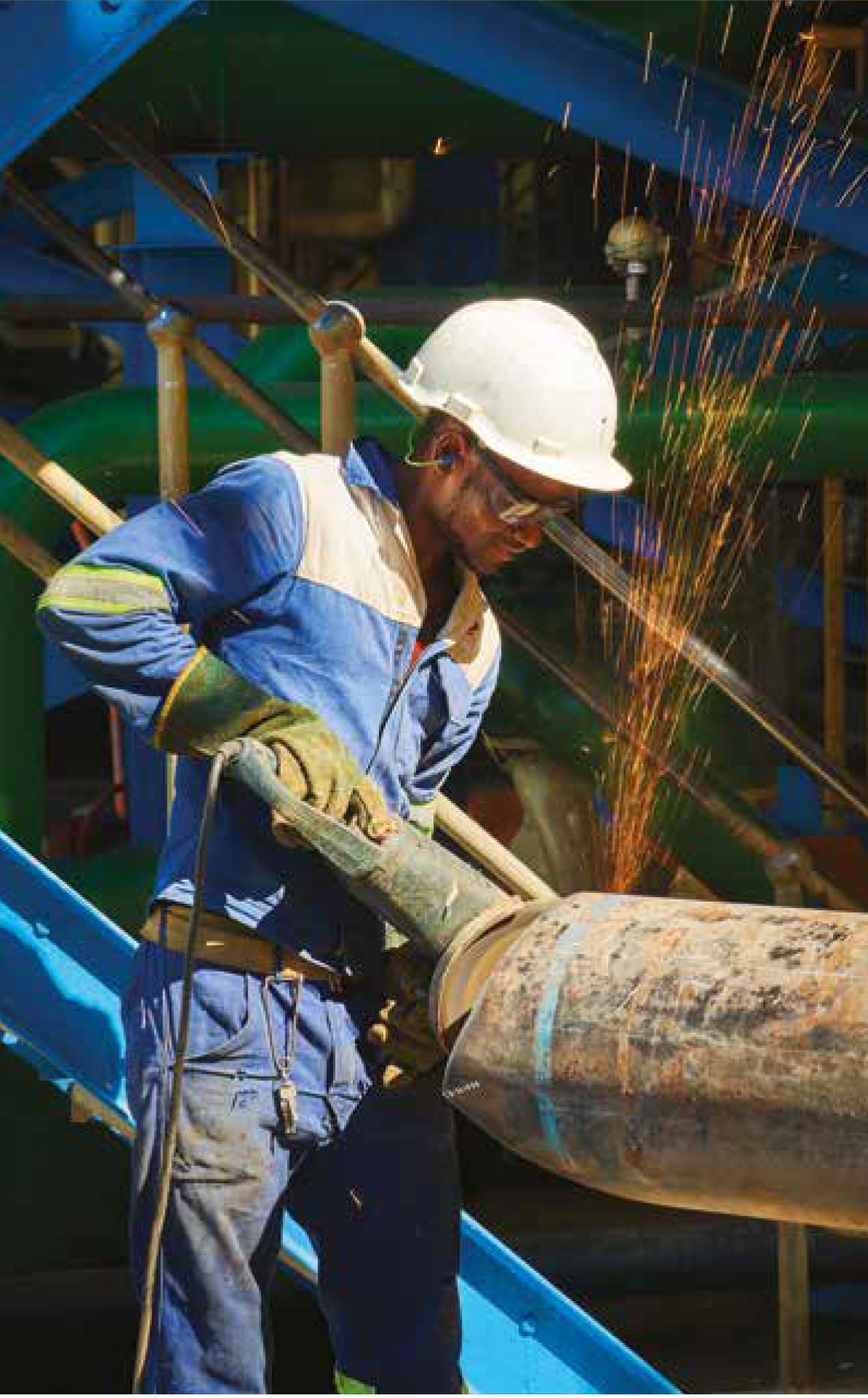
SAFETY, HEALTH AND ENVIRONMENT
Over the years, Tongaat Hulett has achieved good progress along the ZERO HARM journey and has strengthened stakeholder partnerships in this campaign. Without compromising on the effectiveness of existing occupational SHE initiatives targeted at protecting people in the workplace and preventing harm to the neighbouring environment, the company recently adopted an additional strategic thrust of taking SHE campaigns outside the boundaries, beyond its operations into the surrounding communities. The objective of these initiatives relates to ensuring the safety and health of all people as well as looking after the extended environment within Tongaat Hulett’s stakeholder community.
The company’s leadership are committed to sharing and protecting SHE values as demonstrated by adherence to SHE principles, deployment of necessary resources and provision of guidance to stakeholders in an effort to realise the ZERO HARM goal. Satisfactory progress is currently reflected by Tongaat Hulett’s safety and health performance which still compares favourably with leading benchmarked companies across the world, particularly in terms of LTIFR, primary and public health care.
SAFETY
Regrettably, a single work-related fatality was suffered during the year 2017/18. There was a reduction in the number of fatalities recorded during the year when compared to the three suffered in 2016/17 and the five in 2015/16. However, given that Tongaat Hulett’s ZERO HARM campaign is targeted at completely eliminating fatalities as a top priority, one fatality is one too many. It is therefore deeply concerning to have had a fatality experience in the year.
Fatality risk control protocols are established and being monitored at the highest level as part of the organisation’s key safety focus areas.
The company’s safety performance in terms of serious injuries that result in loss of time improved in 2017/18 when compared to the previous year. A LTIFR of 0,083 per 200 000 hours worked, was achieved in 2017/18 reflecting an improvement from 0,093 achieved in 2016/17. The 39 lost time injuries represented a reduction by 2 when compared to 41 recorded in the previous year. This reduction is satisfactory when considering that employee hours worked in 2017/18, of 94 290 022 hours, was 7 percent higher than 87 951 776 hours worked in the prior period representing a higher risk exposure to employees in the current year.
Total Recordable Cases Frequency Rate (TRCFR) and Total Injury Frequency Rate (TFIR) were at 1,37 (2016/17: 1,46) and 2,61 (2016/17: 3,41) respectively. This performance reflects an improvement in total injury performance including minor injuries that required mild medical treatment without experiencing loss of time. The reporting of minor first aid cases however, declined slightly.
FOOD SAFETY
Sugar or sucrose is a natural plant product. It is produced by the sugarcane plant in much the same way that other plants, such as fruit and vegetables, produce sugars. Neither white nor brown sugar contains additives or preservatives of any kind, although the excessive consumption of any food stuff, no matter how harmless, is not conducive to good health. Sugar is a natural and healthy contributor to the enjoyment of food as part of a balanced diet.
Tongaat Hulett’s longstanding reputation of being a producer of high-quality products continues to grow and is acknowledged by its stakeholders, which include customers, regulatory authorities and third-party auditing bodies within and outside the food industry. Such a reputation is protected and strengthened through adherence to structured food safety processes that include managing maize and sugarcane requirements on a nongenetically modified basis and applying a sophisticated identity preservation system. Compliance with these systems and processes is monitored through several annual customer audits that apply global audit protocols. In addition, ongoing attention is paid to the requirements of FSSC 22000 (a Food Safety System Certification used by food manufactures which is aligned with ISO 22000 and includes Good Manufacturing Practices), ISO 22000 and ISO 9001, in terms of quality and food safety standards.
CASE STUDY
HIPPO VALLEY ESTATES WINS BUSINESS
ACTION ON HEALTH AWARD

Tongaat Hulett recognises the impact HIV/AIDS, TB, malaria
and non-communicable diseases (NCDs) have on its business,
its employees and the surrounding community. The company’s
wellness and disease management programme at its
Hippo Valley operation in Zimbabwe was recently recognised by
being named overall winner of the GBCHealth Business Action
on Health Awards in the Workforce and Workplace Engagement
category. This multifaceted programme addresses a range of
elements of SDG 3, “Ensure healthy lives and promote well-being
for all ages”, including addressing maternal mortality, childhood
mortality, HIV/AIDS, TB, malaria and premature mortality caused
by NCDs. In addition, it also addresses sexual and reproductive
health and the achievement of universal health coverage which
includes access to quality healthcare services and safe, effective
essential medicines and vaccines.
Read more
HEALTH
Tongaat Hulett has 40 382 employees (peak milling season) working at 27 locations in 6 countries in Southern Africa. Health issues across the region where the business operates are therefore varied. Tongaat Hulett’s thrust on sustainability requires sound management of business risks, including those posed by ill health among its employees and people from surrounding communities. These risks can result in increased absenteeism, increased production costs and reduced productivity. Managing all health-related risks is therefore imperative to maintain a healthy workforce. An example of the activities undertaken by the business in ensuring the health and well-being of its staff is detailed above.
For the year under review, elements of key health focus areas within Tongaat Hulett operating areas entailed:
- HIV/AIDS management
- Wellness and disease management
- Occupational health programmes with emphasis on managing risks of noise induced hearing loss
- Malaria case control
HIV, AIDS AND TB MANAGEMENT
HIV/AIDS continues to be the leading common health issue significantly affecting the Tongaat Hulett stakeholder community. The UN AIDS 90-90-90 target calls on the global community to reach the following goals:
- 90 percent of people living with HIV should be diagnosed by 2020;
- 90 percent of diagnosed people should be on antiretroviral therapy (ART) by 2020; and
- 90 percent of people on treatment should have fully suppressed viral load by 2020.
It is widely agreed that if all these targets can be met, AIDS related deaths can be dramatically reduced and new infections are expected to decline. Tongaat Hulett has committed to internalise and drive the above targets as far as reasonably possible. All operations now offer HIV counselling and testing services either internally or through service providers. Statistics for 2017/18 show that out of 21 174 employees registered in the company’s health database, at least 16 895 (79,8 percent) now know their status. From the 4 343 HIV positive employees, 3 946 (91 percent) are on ART. The challenge has been to determine the last "90 percent" of the above target i.e. majority percentage of HIV positive employees on ART who have full viral suppression. This challenge is presented by the fact that the company has data for employees on its internal treatment programme only. In South Africa, some employees are accessing ART from private and state facilities and hence their results are not known to the company. Key statistics of the HIV/AIDS management programme for the 2017/18 fiscal year are:
- Employees currently receiving company-provided ART: 3 720 (2016/17: 3 919)
- Voluntary counselling and testing (VCT) uptake: 75,0 percent (2016/17: 88,8 percent)
- Employees knowing their status: 79,8 percent (2016/17: 91,8 percent)
- Number of new employees confirmed HIV positive on testing: 460 (2016/17: 642)
- Number of employees currently HIV positive: 4 343 (2016/17: 4 752)
- HIV prevalence: 21,0 percent (2016/17: 22,7 percent)
- Cost of ART: R1,6 million (2016/17: R1,9 million)
- Seasonal employees/contractors VCT uptake: 7 798 (2016/17: 7 930)
- Seasonal employees/contractors on ART: 1 150 (2016/17: 1 144)
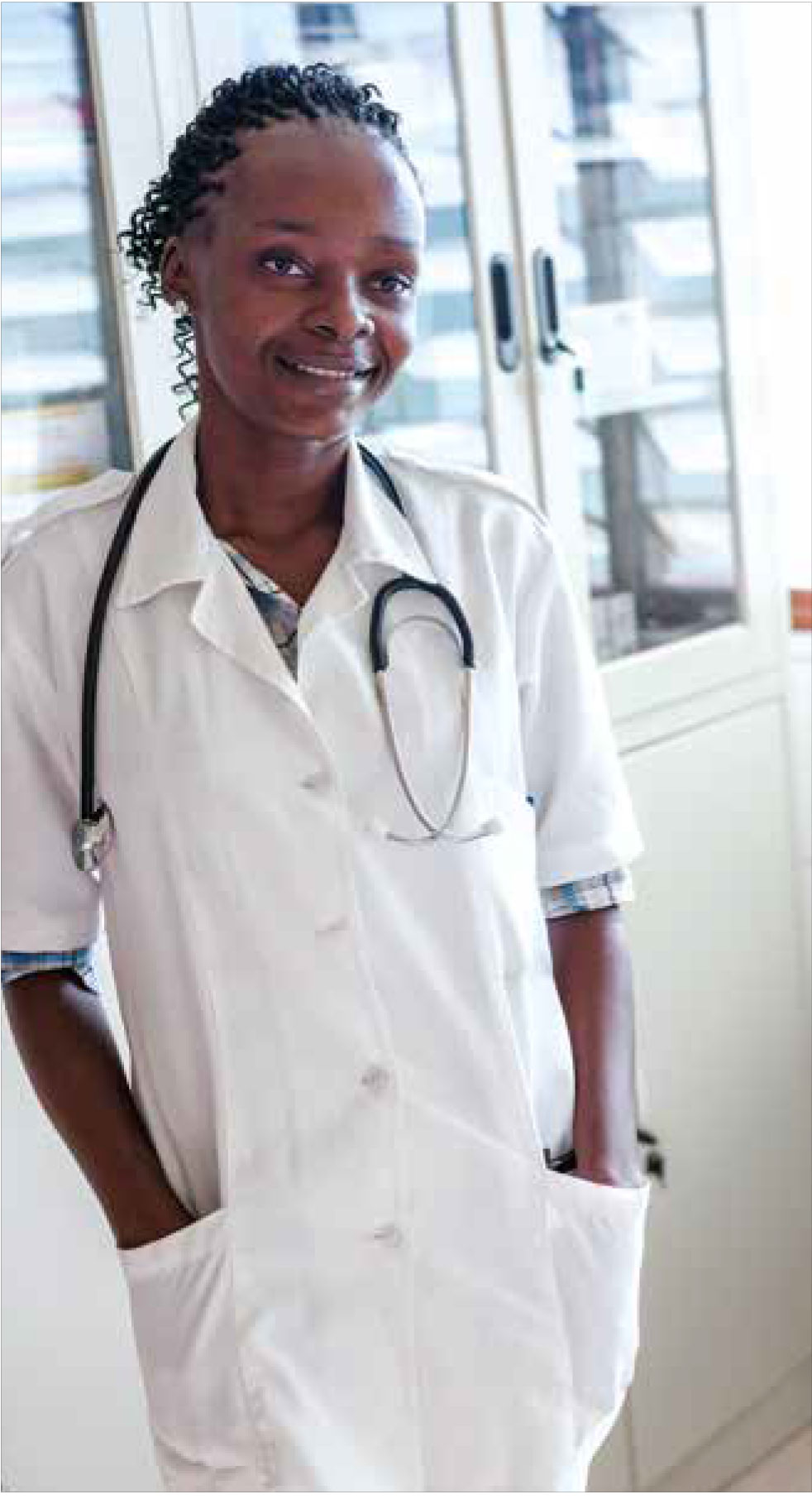
In 2017/18, some operations went through a periodic transition of changing third party independent partners who take the responsibility of facilitating and managing annual wellness day/ HIV testing campaigns. The timing of the transition process resulted in some key performance indicators for 2017/18 declining when compared to the previous year. This transition has now been completed and the negative impact emanating thereof will be addressed in 2018/19. Nevertheless, the management programme for HIV/AIDS is showing a positive effect with:
- The majority of people knowing their HIV status.
- A relatively lower number of new infections.
- More employees being on ART
- A reduction of treatment defaulters being realised.
Notwithstanding the comprehensive programme to manage HIV/AIDS implemented by Tongaat Hulett to date, HIV/AIDS will continue to be a significant threat for the foreseeable future which calls for current campaigns to be maintained.
WELLNESS MANAGEMENT
Health is now recognised as being more than the absence of disease. Tongaat Hulett recognises that wellness issues such as mental health, stress and NCDs are contributing to the burden of disease among people. The SANS 16001 management system is a wellness and disease management system for managing nonoccupational ailments that include NCDs. Tongaat Hulett began the roll-out of SANS 16001 implementation as part of its strategic response to dealing with wellness issues affecting employees
at its three pilot operations (Hippo Valley Estates in Zimbabwe, Voermol Feeds and Maidstone Sugar Mill in KwaZulu-Natal, South Africa). The systems certification pilot project was successfully completed in 2017/18 with all three operations achieving certification. Tongaat Hulett therefore takes a lead as one of the first agro-based companies in Southern Africa to implement the SANS 16001:2013 wellness and disease management system. Experience gained at the three pilot sites is now being applied to align other operations with the standard targeting certification at a later date.
MALARIA
Regrettably, a single death from malaria was reported in 2017/18. Investigations concluded that the deceased employee contracted malaria while he was away from company premises and returned to the company hospital with advanced malaria that sadly claimed his life. The number of cases of malaria recorded for the year at 3 207 represented a 72 percent increase from the 1 869 recorded cases in 2016/17. The significant increase was attributed to high rainfall experienced in the region which increased pockets of stagnant water and therefore mosquito breeding sites. Current malaria control programmes are being revisited with a view to strengthen them where opportunities exist and to explore the possibility of enhancing public-private partnerships in the same programme.
Malaria is endemic in many of the areas where Tongaat Hulett operates and poses one of the biggest public health problems in those areas. The high temperatures which make for ideal sugarcane growing also make it an ideal breeding environment for the malaria vector, mosquitoes. The 2017/18 year saw the wider part of Southern Africa experiencing an outbreak situation with an almost 400 percent increase in malaria cases being recorded at Tongaat Hulett Zimbabwe operations only. This followed the heavy rains Zimbabwe experienced in early 2018.
Integrated malaria control programmes that include vector control, awareness, personal protection, diagnosis and treatment continue. However, the effectiveness and adequacy of these control programmes are being investigated.
OCCUPATIONAL HEALTH RISK MANAGEMENT
The main occupational health risk for Tongaat Hulett is that of noise induced hearing loss as this adversely affects the livelihood of employees after they leave employment. As part of managing this risk, the company focuses on early identification of those at highest risk and taking necessary precautionary measures before the severity of hearing loss increases. Various other occupational health risks are monitored through periodic medical surveillance programmes to ensure employees are not showing signs of over exposure to inherent risks.
In 2017/18, there was no occupational health related fatality (2016/17: 0) nor were there any occupational health cases with irreversible health effects (2016/17: 0). A total of 7 occupational health cases with reversible health effects (2016/17:12) were registered in the year representing an improvement from the previous years’ reported cases.





